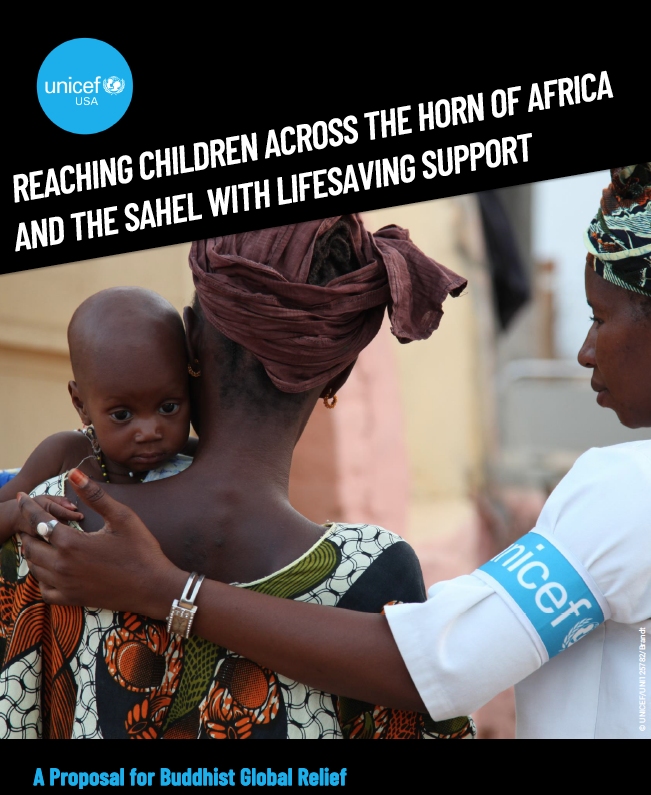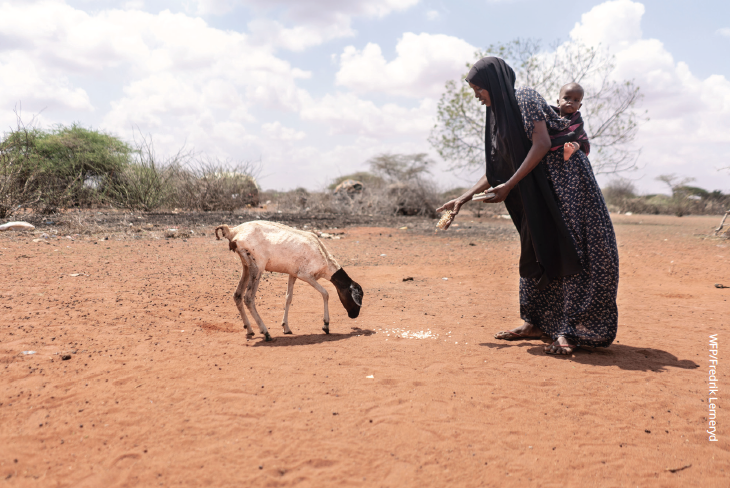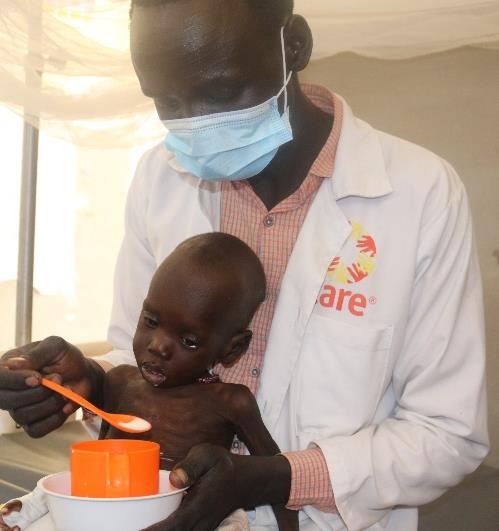By Charles Elliott
Mumina Afyarow is a 29-year-old widow and mother of three. Because of malnutrition, she has no milk left to breastfeed her infant daughter. The drought killed her beloved donkey and goats, which were her family’s only source of income and food. So, Mumina left her village of Garasweyn and walked eleven miles with her children on her back to a displacement camp. But the camp doesn’t have enough basic supplies to care for everyone, so Mumina sold the only bucket she had for $1.50 to buy food. (Action Against Hunger, February 2023, Proposal to Buddhist Global Relief)
This sorrowful story, like a thousand others, emerges from the Horn of Africa as it faces its worst drought in forty years. In the past three years, this region has suffered five failed rainy seasons, and meteorologists predict a sixth in the coming months. Climate change is likely influencing these conditions. Across the region, more than 36 million people are threatened by the drought, with its predictable catastrophic consequences: the death of 9.5 million livestock, the drying up of the wells upon which human survival depends, the spread of disease, the migration of untold numbers of people desperate for food and water, and the terrible toll of human suffering and death.
In response to this unfolding tragedy, Buddhist Global Relief is partnering with five international organizations to provide emergency relief in the Horn of Africa: Action Against Hunger, CARE, Oxfam, UNICEF, and the U.N. World Food Programme. This assistance is targeted to reach the populations in the region most severely impacted by hunger.

SOMALIA
Action Against Hunger reports that Somalia faces the worst levels of acute food insecurity since the reporting of malnutrition rates began. Approximately half of all Somalis are facing food insecurity and 8.3 million are already at imminent risk. Since last year, there has been a 52 percent increase in nutrition admissions to stabilization centers and 1.8 million children are likely to suffer acute wasting from malnutrition by July 2023. As of the first quarter of 2023, almost 40 percent of Somalis are acutely food insecure, and 320,000 face catastrophic hunger with a risk of famine (IPC5), the most severe and life-threatening classification of hunger. Drought conditions and violent conflict displaced 1.6 million people in Somalia between January and October last year. During the same period, the number of children admitted for treatment for severe wasting increased by 67 percent compared to 2021.

ETHIOPIA
Ethiopia continues to be hard hit by drought. Its population is facing exceptionally high levels of hunger due to the five consecutive failed rainy seasons. The compounding impacts of multiple crises that confront these people include drought, localized floods, and a two-year running armed conflict that exacerbates the causes of malnutrition. In just the past three years, the number of people in Ethiopia needing food assistance has almost tripled, from 8.4 million in 2020 to 24.1 million in 2023. Nearly three-quarters are women and children.
The majority of the population in the Somali, Oromia, Sidama, and Southern Nations, Nationalities & Peoples’ regions rely on pastoralism, one of the most ancient forms of subsistence living. Without water, their animals die, depriving these families of their only source of income. Some four million livestock are believed to have died due to the current drought conditions; millions more are very weak and emaciated with no or little milk production – the primary source of nutrition for children. Meteorologists predict below-average rain for this coming spring rainy season – perhaps no rain at all – shattering all hope of relief.
These conditions also impair education and threaten the future of hundreds of thousands of children. Two thousand schools have closed due to drought, affecting 648,000 students as families are displaced or can no longer afford school fees. It’s estimated that an additional 4,558 schools are at high risk of closure.
KENYA
The failure of the past five rainy seasons has forced Kenya to declare a national disaster. Nearly a million Kenyan children already suffer from acute malnutrition and are in urgent need of life-saving treatment. Across the country, 3.1 million people face acute hunger and the country is suffering a 70 percent drop in crop production.
SOUTH SUDAN
In South Sudan, the promise of a better life following its attainment of independence has disappeared. Ten years after the ostensible end of the civil war, the country has plummeted into an unprecedented hunger emergency. This year almost 8 million people – about 63 percent of the population – will probably face crisis levels of food insecurity. As a result of limited funds and rising costs, three out of four households in crisis are unlikely to receive any food aid. Without a scale-up of food and nutrition assistance, and without unhindered humanitarian access, parts of the country risk famine. Inadequate funding for safe water and sanitation is contributing to outbreaks of cholera and other diseases.
CARE has declared a Type 4 crisis in South Sudan – the most severe on its emergency scale – and urgently sought funds for lifesaving food and nutrition assistance. Funds are also needed to address poor water quality and supply, sanitation, and hygiene.

“Eleven-month-old baby Chigoah Gai has just been admitted to the inpatient therapeutic feeding program supported by CARE in Bentiu hospital. He is frail, struggling for breath, with his tiny ribs showing. A clear case of severe acute malnutrition. His grandmother looks worried. Baby Gai has been vomiting and had diarrhea for the past six days. He weighs just 4.6 kg. (10 lb., 2 oz.). Unprecedented flooding forced his family from their home and meant they couldn’t get enough to eat or clean drinking water, causing him to deteriorate. His grandmother says, ‘The baby was used to milk but now all cattle have moved very far away. I sometimes give him goat’s milk but it’s not enough. The baby’s mother left him behind after seeing that we don’t have enough food to eat. She left to look for something, but she never came back. I don’t know where she is.’”
In recent months South Sudan’s precarious humanitarian situation has worsened. Violence and conflict persist; the country faces a sharp increase in food and fuel prices, exacerbated by the Russian invasion of Ukraine. Climate shocks create the worst of both worlds: localized flooding and drought. An estimated 2 million people, including 1.3 million children under the age of 5 and 676,000 pregnant and lactating women, are expected to be at risk of acute malnourishment. Especially in internally-displaced persons camps and settlements, infectious disease outbreaks are contributing to an ongoing rise in morbidity.
Buddhist Global Relief responded to these terrible conditions by inviting its five NGO partners to submit proposals for emergency funding. Each of these organizations – esteemed for their regional expertise, resources, and rapid-response capabilities – provided BGR with proposals that identified the most effective way to utilize our contributions in addressing these interrelated crises:
• $50,000 to Action Against Hunger’s water and food security emergency responses in Somalia, which incorporates the provision of water vouchers, sanitation services, and hygiene kits as well as direct cash assistance, cash for work programs, livelihood inputs, and financial support provided via micro enterprises and Village Savings and Loan Associations.
• $50,000 to CARE’s nutrition emergency response in South Sudan, which includes screening and treatment of children suffering from malnutrition; CARE’s food security emergency response includes food/cash distribution to the most vulnerable households (restricted, unconditional cash) as well as distribution of agricultural and vegetable kits.
• $50,000 to Oxfam America’s crisis response in Ethiopia, which focuses on food security, including in-kind food distributions and unconditional cash transfers so basic needs can be met; distribution of seeds and tools; and rehabilitation of water systems.
• $50,000 to UNICEF’s emergency programs throughout the Horn of Africa. Addressing household water insecurity is the core driver of UNICEF’s regional drought response in 2023. Additionally, UNICEF’s support of critical nutrition activities includes: (1) procurement, prepositioning, and distribution of therapeutic supplies for children; (2) support for the prevention and treatment of acute malnutrition; and (3) promotion of appropriate nutritional support for mothers, infants, and young children.
• $100,000 to the U.N. World Food Programme’s drought response plan in Somalia, which has been providing relief food assistance to 4.4 million beneficiaries each month. WFP has 12 offices in Somalia and works in partnership with over 100 cooperating partners (85 percent local NGOs) and over 1,490 food retailers across the country.
These grants, totaling $300,000, collectively represent the largest emergency donations package for Africa in the history of Buddhist Global Relief. Each of these partners has committed to providing BGR with reporting sufficient for us to be accountable to our donors and to provide our supporters with appropriate information about the efforts these funds are supporting.
We are deeply thankful to each and every person who has supported BGR’s work, and we are grateful for each and every donation. Each supporter and each donation directly contributes to our efforts to reduce suffering. Recalling once again the Buddha’s statement that “hunger is the worst illness,” BGR’s leadership, staff, and volunteers remain grateful for these opportunities to help those in need.






